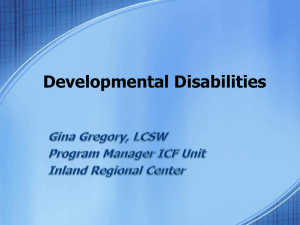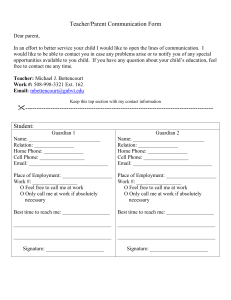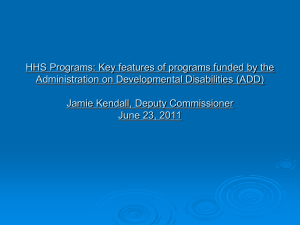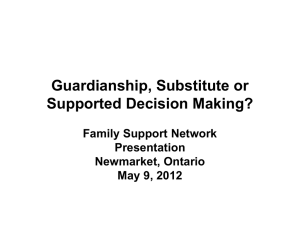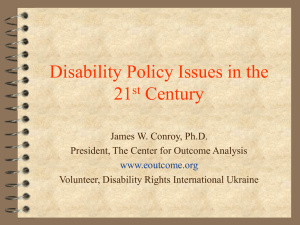Developmental Disabilities
advertisement
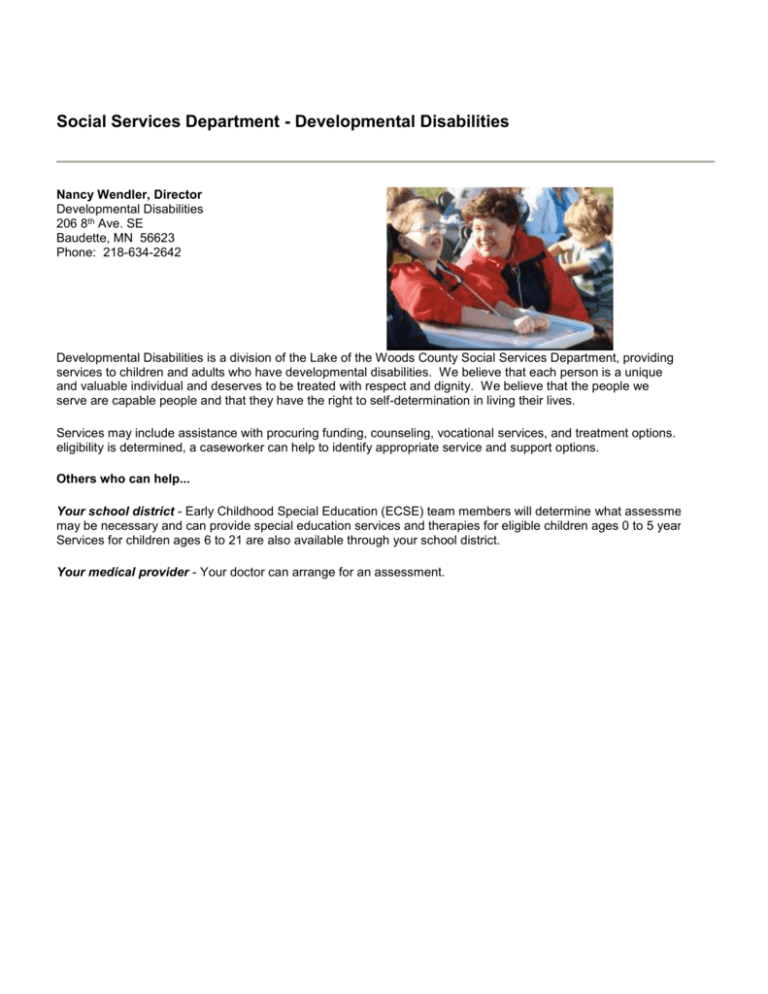
Social Services Department - Developmental Disabilities Nancy Wendler, Director Developmental Disabilities 206 8th Ave. SE Baudette, MN 56623 Phone: 218-634-2642 Developmental Disabilities is a division of the Lake of the Woods County Social Services Department, providing services to children and adults who have developmental disabilities. We believe that each person is a unique and valuable individual and deserves to be treated with respect and dignity. We believe that the people we serve are capable people and that they have the right to self-determination in living their lives. Services may include assistance with procuring funding, counseling, vocational services, and treatment options. Once eligibility is determined, a caseworker can help to identify appropriate service and support options. Others who can help... Your school district - Early Childhood Special Education (ECSE) team members will determine what assessments may be necessary and can provide special education services and therapies for eligible children ages 0 to 5 years. Services for children ages 6 to 21 are also available through your school district. Your medical provider - Your doctor can arrange for an assessment. Social Services Department - Developmental Disabilities To apply for Developmental Disabilities call: 218-634-2642 ELIGIBILITY FOR SERVICES Eligibility Criteria for Children Ages 0 to 5 Ages 5 to 18 Fees for Services Application Process When your Child Turns 18 Eligibility for Age 18 and Over Fees for Services Application Process Children grow at their own pace but there are some general developmental guidelines that children follow. If you, your child's medical providers, or someone at school has noticed significant delays in cognitive development and adaptive functioning, or if your child has been diagnosed with a condition that results in impairment of general intellectual functioning or adaptive behavior similar to that of persons with mental retardation, this may suggest that your child could benefit from Developmental Disabilities (DD) services. If your child's only condition is medically related, your child may or may not qualify for DD services. It is important to remember that your child does not need to be eligible for Lake of the Woods County DD Social Services in order to access many other services, funding sources, and community resources. Is your child eligible for Developmental Disabilities (DD) Social Services? CHILDREN UNDER 5 YEARS OF AGE: For a child under the age of 5 years, there are three main ways that DD social service eligibility is determined: 1. The child has test scores of more than two standard deviations below the mean in two global areas of functioning, one of which is cognition, and the child is at risk of mental retardation. 2. The child may have been assessed and diagnosed by a psychologist as having global developmental delays. 3. The child may have a related condition that results in impairment of general intellectual functioning or adaptive behavior similar to that of persons with mental retardation. This may be indicated by substantial limitations in three or more areas of life activities, including self-care, understanding and use of language, learning, mobility, self-direction or judgment, and independent or daily living skills. Diagnoses which may (or may not) be related conditions include, but are not limited to: Cerebral Palsy Autism PDD Epilepsy Prader-Willi Syndrome Traumatic Brain Injury Fetal Alcohol Syndrome (FAS)/Fetal Alcohol Effects (FAE) CHILDREN OVER 5 YEARS OF AGE: For a child over 5 years of age, a psychological evaluation (IQ score) completed within the last three years, and an adaptive skills assessment that documents delays must be provided. The child must show a full scale IQ of 70 or lower, or be diagnosed with a Related Condition (see list above) and show both significant deficits in adaptive skills and have similar service needs to a person with mental retardation. Lake of the Woods County will assist with obtaining an evaluation, if one is not available from the school or through private insurance. Is there a fee for Children's DD social services? There may be a fee for DD services, based on family size and income. If you are paying a fee for TEFRA, or are receiving Social Security or Medical Assistance, we do not collect an additional fee. The application process for children: To apply for children's DD services, call 218-634-2642. You will be asked for some basic information over the phone to determine if your child may meet the criteria for eligibility. If your child appears to be eligible, a letter will then be sent to you outlining the intake process and requesting documents and information. Once those items have been provided, a social worker will contact you to schedule an appointment. At the initial appointment, the social worker will discuss basic services and funding streams available. If your child is determined to be eligible for DD social services, you will be notified by letter and an ongoing social worker will be assigned to meet with you to develop an Individual Service Plan for your child. The social worker can help to identify programs and services that may be available to assist with the care of your child. When your child turns 18 years old: Legal status of your child changes at age 18. Your child becomes a legal adult with all the rights and responsibilities of any other adult. If you have concerns that your child's judgment or decision-making is a threat to their welfare, if they are unable to make responsible personal decisions, and/or are unable to meet their needs, you may wish to explore guardianship or conservatorship of the person and/or estate of your child. This is a legal procedure, done in court, and financial help is available for this process. A guardian or conservator may be a relative, another individual, or an agency. At age 18, income eligibility is based on your child's income and assets, not on the family income. Your child should apply for medical assistance (MA), Minnesota Supplemental Aid (MSA), and Social Security Income (SSI). These are important funding sources for services. Your school district will work with your child and your child's interdisciplinary team to develop a transition plan. Your child's school meetings are important planning tools and can help the team plan for future work and housing. If your child plans to move after school, early planning is essential to start the process to request funding and supports for residential services, as these are not mandated services. Funding for these supports may be arranged through MN Rehabilitation Services (training and job placement) or through your social worker at Lake of the Woods County Social Services (ongoing support). In addition, a variety of community resources are available to provide vocational services for your child. ELIGIBILITY FOR INDIVIDUALS AGE 18 AND OVER: To be eligible, an adult must be a person with mental retardation or a related condition. A person with mental retardation means a person who has substantial limitations in present functioning, manifested as significantly subaverage intellectual functioning (IQ under 70), existing concurrently with demonstrated deficits in adaptive behavior and who manifests these conditions before the person’s 22 nd birthday. A person with a related condition means a person who has been diagnosed as having a severe, chronic disability that meets all of the following conditions: 1) is attributable to cerebral palsy, epilepsy, autism, Prader-Willi syndrome, or any other condition, other than mental illness or an emotional disturbance and is found to be closely related to mental retardation because the condition results in impairment of general intellectual functioning or adaptive behavior similar to that of persons with mental retardation and requires treatment or services similar to those required for persons with mental retardation; 2) is manifested before the person reaches 22 years of age; 3) is likely to continue indefinitely; and 4) results in substantial functional limitations in three or more of the following areas of major life activity: a. self-care; b. understanding and use of language; c. learning; d. mobility; e. self-direction; or f. capacity for independent living. Is there a fee for DD social services for adults? There may be a fee for DD services based on the adult’s income and assets. If the individual is eligible or receiving Medical Assistance there is not a fee. The application process: To apply for adult DD services, call 218-634-2642 and ask to speak with the intake worker. You will be asked for some basic information over the phone to determine if the individual meets the criteria for eligibility. A letter will then be sent outlining the intake process and requesting documents and information. If further assessments need to be done, Lake of the Woods County will assist with obtaining an evaluation. Once those items have been provided, a social worker will schedule an appointment. At the initial appointment, the social worker will discuss basic services and funding streams available. If the adult is determined to be eligible for DD social services, the adult and/or the individual’s legal representative will be notified by letter and an ongoing social worker will be assigned to meet and develop an Individual Service plan and assist in obtaining services. Social Services Department - Developmental Disabilities FUNDING SOURCES For information on these funding sources and how to apply, call Lake of the Woods County Social Services at 218-634-2642 Private Health Insurance Your health insurance may pay for assessments, adaptive equipment, therapies, counseling, and support services. Medical Assistance (MA) This is a federal program that pays for medical care and some support services for low income families or individuals 18+ years of age. TEFRA (Tax Equity and Financial Responsibility Act of 1982) This program provides medical assistance for children with qualifying disabilities who live with their families and do not qualify for MA because family income is too high. Only the child's income and disability are used to determine eligibility. There is a state parental fee for TEFRA, based on family income and family size. A worksheet is available to estimate parental fee. Medical Assistance for Employed Persons with Disabilities (MA-EPD) This program provides medical assistance for people with disabilities who work, at little or no cost. Supplemental Security Income/Retirement & Survivors Disability Insurance (SSI/RSDI) 'Cash benefits payable to children with qualifying disabilities whose families have very limited income. At age 18, family income is no longer a factor for eligibility. Minnesota Supplemental Aid (MSA) Provides additional cash grant to supplement SSI/RSDI income for anyone living in the community who is blind, or for other persons over age 18. Group Residential Housing (GRH) Funding for room and board in assisted living sites licensed under group residential housing licensing rules. Waiver Programs Eligibility for various Medical Assistance Waiver programs is determined by Public Health Nursing or Social Services. You must be on MA or TEFRA to be considered. Consumer Directed Community Based Services This is a Lake of the Woods County funded program where funds are given directly to a family to purchase the services needed. This is a very flexible program. The family can pay neighbors or relatives to assist, buy respite care, purchase special equipment, etc. A plan is developed with the family and social worker and the funds can be expended based on the plan. Fees apply. Social Services Department - Developmental Disabilities GUARDIANSHIP AND CONSERVATORSHIP Recent legislative changes: New legislation changes the definitions of guardian and conservator. (August 2003) Now, the term “guardian” will always refer to someone who has all or some of the powers over the individual. (Powers over the individual include decision-making in areas such as where to live, consenting to medical procedures, and taking care of food, clothing, and shelter.) The person under guardianship will still be called a ward. Previously, a guardian was someone who had powers over all the affairs of the individual and/or a person’s estate (i.e. financial matters); a conservator had power over some, but not all, of the affairs of an individual and/or his/her estate. The use of the term “conservator” will now be used exclusively to describe someone who has power over the estate of an incapacitated person – not power over the individual. The incapacitated person in this case will be called a “protected person”. The new law also allows a parent to appoint a guardian, by a will or by a writing executed in the same manner as a health care directive, for an unmarried child who the parent believes is incapacitated. A court must then confirm this appointment. If a guardian appointed is appointed by this provision, it does not require a finding that the individual is incapacitated. (This is advantageous to parents and family members because they may not want to make public, information that their child is incapacitated.) In other provisions, the court can now appoint a temporary substitute guardian for up to six months to replace a guardian who is not performing effectively. Also, wards will not lose the right to vote unless specified by the court. Guardianship will continue until terminated, even if the guardian or ward moves to another state. The process for establishing guardianship or conservatorship: The State of Minnesota now provides public access to the guardianship/conservatorship process by going to their website at mncourts.gov. At that website you will find the forms needed to file a guardianship, emergency guardianship and a conservatorship. There is also a tutorial at the self-help site, which is very informative. Once the documents are completed, they can be submitted to the 9th District Court Administrator in Baudette. Since guardianship and conservatorship are legal processes, it is also an option for a guardian/conservator get an attorney to represent them. Many local attorneys will accept payment "In Forma Pauperis" -- this means that the attorney's fees are paid for by the County. In Forma Pauperis is determined based on the income of the person with the disability, not that of the proposed guardian or conservator. To qualify for In Forma Pauperis, the individual with the disability must be considered indigent or not have an annual income that is greater than 125% of poverty level. Generally speaking, a person is considered indigent if they receive Medical Assistance. If you are uncertain whether the individual with the disability would qualify for In Forma Pauperis funds, talk with the attorney you contact. A physician's statement from the proposed ward's physician will be needed and the proposed guardian/conservator will need to consent to a background study. The attorney can draft the petition for signature and file it with the court. Once the documents are filed with the court, a hearing will be scheduled. An attorney is then appointed by the court to represent the proposed ward or protected person. At the hearing, the judge will make a decision and, if the petition is accepted, letters of guardianship or conservatorship will be issued to the guardian or conservator.
